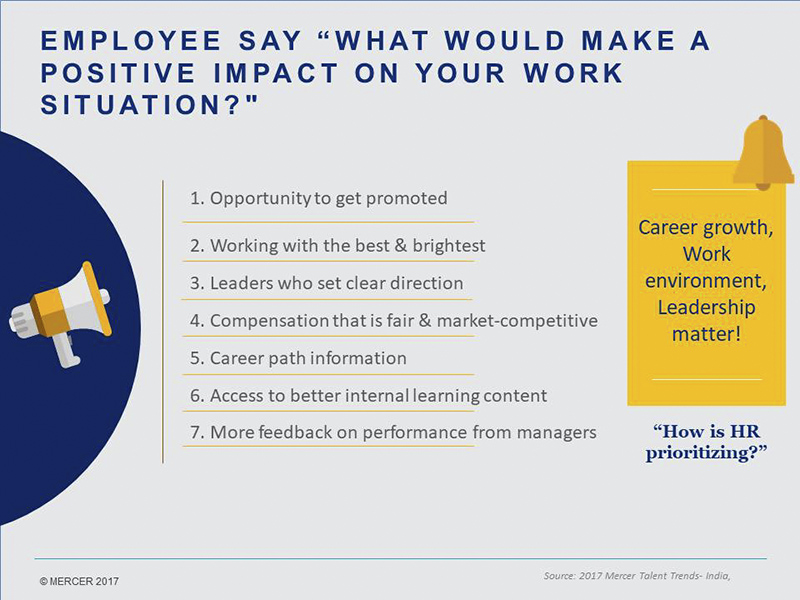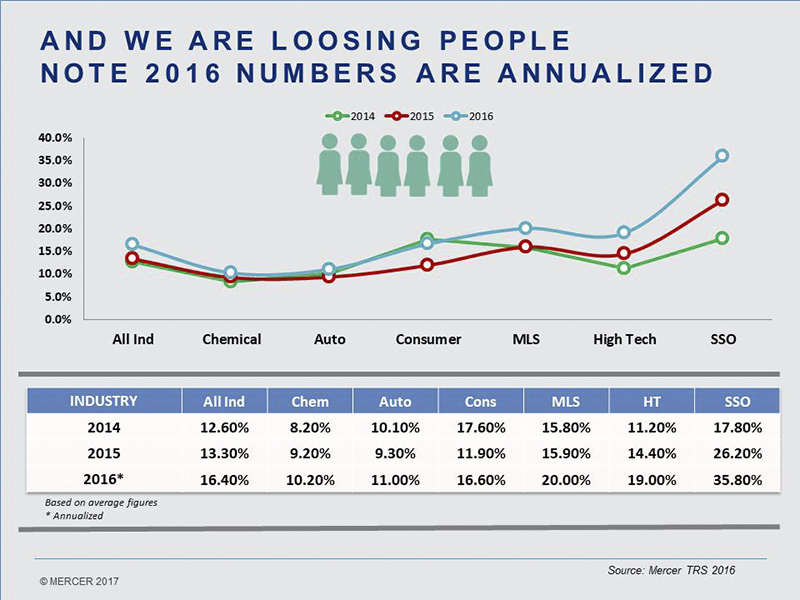Navigating HR Challenges in India

Employees of an Indian technology company work at an office in the outskirts of New Delhi. India Inc. is now welcoming five generations in the workplace and embracing the shifting nature of jobs.
Photo: Money Sharma/AFP/Getty Images
India is one of the world’s fastest growing major economies, recent concerns of a slowdown notwithstanding. India is also home to a young population, and it is expected that by 2020, the average age in India will be 29. Should the current rate of population growth continue, India would overtake China to become the most populous nation by 2050. The millennials and Generation X demographics dominate the Indian workforce, with 98 percent of working individuals belonging to these generation segments.
While it is popularly called out as a “demographic dividend,” it also implies that economic growth and resulting job creation need to serve the needs of the millions of new graduates entering the workforce each year. The situation has been exacerbated by the rapidly evolving skills requirements that come with the advent of new technologies. Additionally, the curricula in most higher-educational institutions have not kept up with this evolution. We hope that the government will proactively take steps to address the burgeoning gap through broad-based reforms in education and focus on better partnerships between the academia and the corporate sector.
According to Mercer Talent Trends 2017, in India, jobs in the next three years will focus more on design and innovation, and as more jobs will be done virtually, salaried workforce will primarily be in management roles, with much broader spans of control. As India Inc. welcomes five generations in the workplace and embraces the shifting nature of jobs, it will be critical how HR professionals manage to attract and retain today’s talent, while striking the right balance and finding a sustainable way to build capability for the future.
Shift in What Indian Employees Value
Mercer Talent Trends 2016 showed that an Indian employee valued “focus on learning” as the most important aspect of the employee value proposition. However, in 2017, the focus has shifted to “pay and promotion,” signaling a shift to what a younger workforce demographic typically values.
Ninety-three percent of Indian employees want to be recognized and rewarded for contributions beyond their role definitions. They also seek greater clarity on performance ratings and periodic constructive feedback.
With the wide adoption of technology, 54 percent of workers want their organizations to offer more flexible work options. Health and wellness are also accorded high priority—54 percent of employees want their employers to focus on this aspect by way of offering compelling benefits. While the baby boomers and traditionalists sought the comfort of long-term careers, the younger workforce in India would prefer to have the liberty to navigate their own careers.
Seventy percent of workers would rather work on a contractual basis, resonating with the global rise of the gig economy. Per the employees surveyed, a few key areas that would make a positive impact on their work are represented below:
Employee Flight is a Reality
In the two decades that followed India’s economic liberalization since the early 90s, robust job expansion and greater-than-inflation wage growth has meant that the employees in general were more engaged at the workplace. However, with increasing automation and the shifting nature of jobs, there may be an increasing sense of disenchantment with the traditional full-time model.
In 2016 there was a 16.4 percent average annual attrition rate. The turnover rate is higher in roles in high demand, such as sales and data science. This can perhaps be attributed to those 20 percent of employees reporting that they do not feel empowered to create their own success at work. Furthermore, a staggering 60 percent of employees are likely to change jobs within the next 12 months.
Thirty-three percent of companies have instituted a retention bonus policy. This policy is aimed at specifically retaining special skills and retaining employees with flight risk. More can be done by companies in India with respect to creating compelling career paths for employees. For example, providing employees with a skills development and learning roadmap, which would enable them to fulfill their career aspirations.
Addressing Human Resource Challenges
Evidently, India’s enormous labor force presents diverse HR challenges, and for HR teams to be future-ready, organizations must adapt to changing trends.
Facilitate a culture shift. Organizations must recognize the need for a fundamental cultural shift in order to prepare for digital disruption. The people strategy and talent interventions have to be evidence-based, using workforce analytics and closely linking to business outcomes. As organizations prepare to be more customer-centric and agile, HR as custodians of culture have to drive a shift in employee mindset so that employees feel more empowered and energized about their work.
Transform the organization. HR teams must partner with business strategically. In doing so, they must nurture and develop leaders for the future, grooming them into future leaders with the skills to take on ever-changing business environments. Strategies that could be implemented include: cross-functional or cross-geography experience; global exposure; customized career plans; rotational stints; mentoring and coaching; and high-impact action learning projects.
Associated costs must also be closely monitored to maintain adequate checks and to bolster growth. Buying talent by paying above the market is no longer sustainable, and therefore HR professionals have to focus on a combination of build and buy strategies to bring in the skills needed to make their organizations future-ready. In this regard, 54 percent of Indian CEOs are likely to transform their organizations into significantly different entities over the next three years.
Know your talent. Each generation has a different requirement, and a deeper look at generational preferences outlines varying total rewards priorities for each. Organizations must ascertain what motivates this multigenerational talent. They must also design and maintain an engaging rewards philosophy and leverage on data analytics to attract and retain talent. To this effect, 85 percent of Indian CEOs are planning large investments on data analytics tools. Companies are currently tracking a) workforce metrics such as turnover, demographics, attraction and retention; and b) organizational efficiency metrics such as financial impact and cost efficiencies.
HR may also like to start tracking employee development, manager efficiency and succession planning.
Gearing Up for the Future
In view of the multiple challenges, human resource departments in India face a daunting task. Navigating through these challenges requires organizations to be responsive, agile and innovative. There may be significant opportunity for the HR function to focus on its own capability development, by way of becoming more comfortable with the use of data analytics and new technologies. HR professionals will need to have a much deeper understanding of the evolving business models and implications of digital disruption on people strategy.
With profitable growth as the new “mantra,” double-digit salary growth may not always be feasible. And therefore building a more compelling employee value proposition, based on the rewards philosophy and the business model will be crucial. To drive engagement and productivity among the young millennial workforce will require innovative talent practices, based on a deeper data-led understanding of what different employee populations seek and what drives them.
This is the third part of a series on “Navigating HR Challenges in Asia.” Read the first part here. And the second part here.





